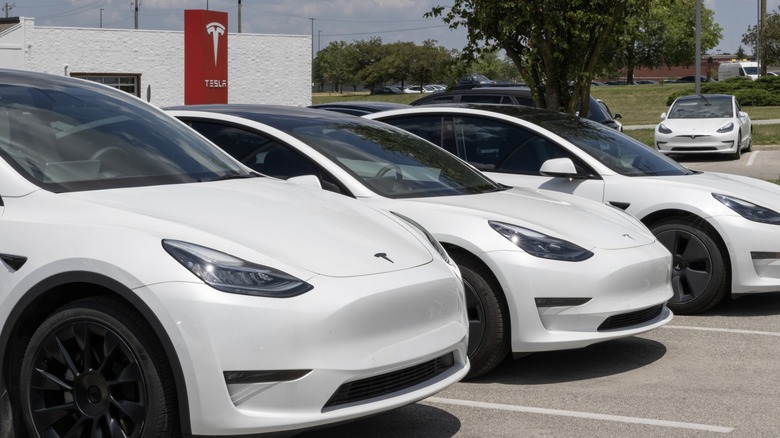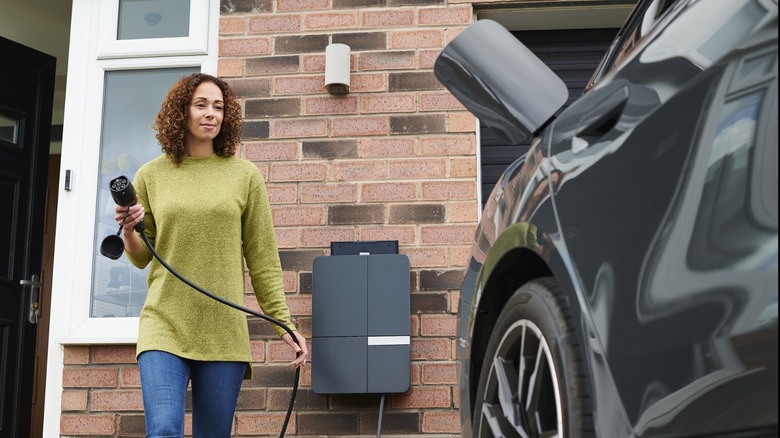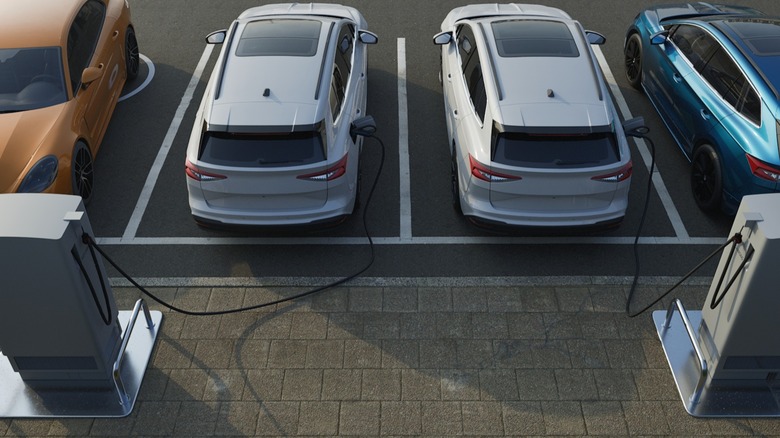What Are The True Costs Of Owning An Electric Vehicle In 2025?
Electric vehicles are gradually becoming a normal part of our lifestyle. In fact, you may have noticed more of them silently moving through your neighborhood lately. That's because they've been designed to be a cleaner, more sustainable alternative to traditional internal combustion vehicles. And as they've proven to be stable, reliable, and increasingly affordable, many people are now wondering if it's the right time to switch from gasoline-powered to electric.
If you're considering making the switch, there are big questions you need to ask when buying a new electric car. While it starts with researching prices online, it doesn't end there. You have to consider other costs as well.
You might be saving money on fuel, but you'll still be spending on charging the vehicle. There's also maintenance to think about, although these costs are generally lower than those for a typical internal combustion vehicle. You still have to consider the cost of setting up a charging dock at home and learn how to manage your battery so it serves you well for a long time.
But don't worry. We've put together a simple guide to help you understand and navigate all the major expenses associated with owning an electric car in 2025. That way, you're able to make a more informed decision and avoid piling on expenses you can't afford to keep up with long-term.
How much does it cost to buy an EV?
In 2025, you have more EV choices than ever. If you're looking for an affordable EV, models like the Chevrolet Bolt and Nissan Leaf start at around $30,000. If you want something with more space and features, mid-range options from Hyundai, Volkswagen, and Tesla cost $40,000 to $50,000. However, luxury brands like Genesis, BMW, and Audi start at $60,000 to $70,000, with high-end models such as Porsche going well over $100,000. High-end EVs often have better technology, longer driving ranges, and faster performance.
But the price you see at the dealership isn't always the price you'll pay. The U.S. government wants to encourage people to make the switch, with the goal that half of all new cars sold in the U.S. will be zero-emission by 2030. To help achieve that, there's a federal tax credit of up to $7,500 on certain new EVs. Some states offer extra incentives, too.
Still, EVs are more expensive to buy than gas-powered cars. But remember that EVs often come with features we wish every car had – ones either optional or unavailable in internal-combustion vehicles. For instance, EVs come with regenerative braking, a feature traditional cars don't have. And advanced safety systems that come standard in most EVs are often available only in higher trims or as part of optional packages in internal- combustion vehicles. So the price gap isn't as big as it seems, and it will only get smaller as the technology improves.
How much does a home charging setup cost?
The cost of setting up a home EV charger depends on the type of charger and the electrical work your home needs. Most EVs come with a Level 1 charger, which plugs into a standard household outlet. While easy to use, it's very slow, and could take more than 48 hours to fully charge a car.
More efficient is the Level 2 charger, which uses a 240-volt outlet and can charge to 80% from empty in four to 10 hours. Most people go for this because it lets them charge their car overnight. However, this convenience comes at a price.
A Level 2 charger costs $500 to $700, but that's only a small part of the expense. Installation adds another $600 to $1,200, depending on your home's electrical setup. If you already have a 240-volt outlet, installation is cheaper, but if an electrician must install a new circuit or upgrade your electrical panel, the price increases.
Sure, you could use public charging stations, but they're still largely a work in progress. Sometimes, there aren't enough nearby, and you might have to wait in line or deal with incompatible or broken chargers. Charging at home is just more convenient.
Many utility companies offer rebates for home charger installation to encourage people to switch to electric vehicles. Some states also provide tax incentives to cover part of the cost. So before installing a home EV charger, check what discounts are available in your area.
Is electricity cheaper than gas?
The average cost of electricity in the U.S. is about 16 cents per kilowatt-hour. EVs use 25 to 40 kWh per 100 miles, so charging at home usually costs $4 to $6.40 for 100 miles of driving. A gas-powered car that gets 30 miles per gallon needs about 3.3 gallons to cover 100 miles. At an average gas price of $3.14 per gallon, that would cost around $10.36, which is about twice as much as charging an EV at home.
Ideally, charging an electric car at home is the most convenient option, but it's not possible for everyone. Homeowners with garages or driveways can install a Level 2 charger, but people who rent, live in apartments or don't have private parking may have to rely on public charging stations instead.
Public charging, however, is more expensive. Fast-charging stations can cost anywhere from 30 to 50 cents per kWh, meaning a 100-mile charge runs $7.50 to $20. Some public chargers also require membership fees and charge extra if a car is left plugged in after it's fully charged. If you can't charge at home, this makes owning an EV less cost-effective unless you can find a free public charging station.
How much you pay also can depend on when you charge. In some areas, utility companies lower their rates at off-peak hours, usually at night.
What's the maintenance and insurance cost of an EV?
Electric cars have less-complex powertrains than regular gas cars, so they have fewer moving parts to take care of and fewer fluids to check — and there's less that can go wrong. With a gas car, you have to change the oil, spark plugs, and seals. But with an EV, you don't have to do any of that.
The biggest maintenance concerns for an EV are the tires, cabin air filter, and electrical system. EVs are heavier than gas cars and have instant torque, which puts more stress on the tires. So you still need to check tire pressure, and you must replace brake fluid, but only every five years. You also need to take the EV in for essential maintenance to ensure the components are all in good condition. In a year, that could cost you less than $1,000.
Maintenance does get expensive when you need to replace parts. If you get into a collision, it can be harder to find a mechanic and parts than with a gas car. This generally also raises the insurance costs of an EV compared to an internal-combustion vehicle. An EV's annual coverage could be about 20% higher. Of course, factors like the car's model, your location, driving history, and credit scores come into play. For instance, full coverage for a high-end Tesla could run you over $5,000 a year.
What if you ever need to replace the battery?
Modern EV batteries are made to last a long time. Many automakers offer warranties that cover the battery for eight years or 100,000 miles, whichever comes first. And many EV batteries last even longer. However, if your battery needs to be replaced after the warranty expires, it can be expensive. A new EV battery costs about $7,000 to $30,000, depending on the model.
But battery prices are expected to go down as technology improves and more batteries are made. Plus, total battery failure is rare. Sometimes, there are production issues, as happened with the Chevrolet Bolt EV and Hyundai Kona Electric. In those cases, the manufacturers recalled the cars and replaced the batteries for free, even if the warranty had ended.
Nonetheless, EV batteries don't suddenly stop working. Instead, they slowly lose capacity over time, like a cellphone battery. If you take good care of your battery, you may never need to replace it. To keep it in good condition, avoid charging it to 100% or letting it drop to 0%. It's better to do small, frequent top-ups instead of large, infrequent charges. Also, use fast charging only when necessary. While DC fast chargers are useful for long trips, using them too often wears down the battery faster. If you adhere to these tips, then like many EV owners, you may never have to replace your battery before selling or trading in your car.
Do EVs have good resale value?
When you sell a used car, its value depends on mileage, condition, and how old it is. For gas cars, driving more miles can mean more wear and tear on the engine, transmission, and exhaust, which lower resale value. With EVs, mileage doesn't affect the car the same way because there are fewer moving parts and less mechanical stress. Instead, an EV's long-term performance is mostly determined by battery health.
All batteries lose some capacity over time. For an EV, this means the car's driving range gets shorter. Early EVs lost value quickly. But today, EV batteries can retain about 80% of their original battery capacity even after several years of use. If you're proactive with battery maintenance, the EV can have a good resale value, even with high mileage.
Regardless, gas cars still hold their value better than EVs for now. This is because EV technology changes fast. Newer models come out with better batteries and features, which makes older EVs lose value faster. An iSeeCars study showed that after five years, EVs lose about 49% of their value, while gas cars lose around 39%. This isn't great news if you're selling, but if you're buying, it means you get the benefits of an EV at a lower price. And when you decide the time is right, make sure to learn about common mistakes new electric vehicle owners make so you can avoid them.






